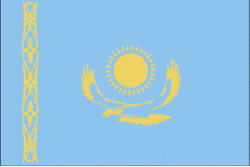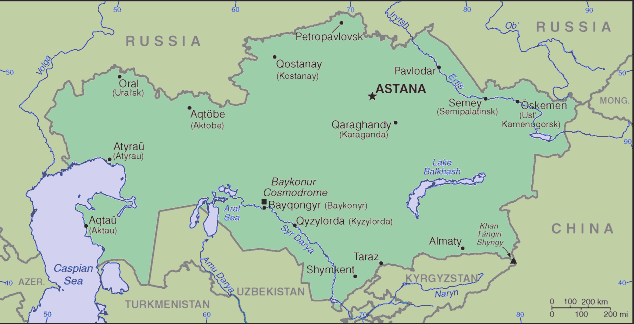Traveling Luck for Kazakhstan. Kazakhstan, Asia
Kazakhstan is located in Central Asia, northwest of China; a small portion west of the Ural River in eastern-most Europe.
Land in Kazakhstan is extends from the Volga to the Altai Mountains and from the plains in western Siberia to oases and desert in Central Asia.
Kazakhstani land covers an area of 2717300 square kilometers which is slightly less than four times the size of Texas
Kazakhstan has borders with China for 1533km, Kyrgyzstan for 1051km, Russia for 6846km, Turkmenistan for 379km and Uzbekistan for 2203km.
 Kazakhstani national flag (Flag of Kazakhstan)
Kazakhstani national flag (Flag of Kazakhstan)
As for the Kazakhstani climate; continental, cold winters and hot summers, arid and semiarid.
Kazakhstani(s) speak Kazakh (Qazaq, state language) 64.4%, Russian (official, used in everyday business, designated the "language of interethnic communication") 95% (2001 est.).
Places of note in Kazakhstan
- Spetsgorodok
- Shymkent
- Taraz
- Astana
- Pavlodar
- Ust'-Kamenogorsk
- Semipalatinsk
- Aqtöbe
- Petropavlovsk
- Atyrau
- Kökshetaū
- Zhezqazghan
- Turkestan
- Balkhash
- Sarkand
- Kentaū
- Ridder
- Shchūchīnsk
- Stepnogorsk
- Zyryanovsk
- Aqsū
- Dzhetygara
- Talghar
- Kapchagai
- Līsakovsk
- Shu
- Qarataū
- Arys'
- Ayteke Bi
- Abay
- Aksay
- Atbasar
- Zharkent
- Zhangatas
- Ayaköz
 Kazakhstani map
Kazakhstani map
Regions of Kazakhstan
Native Kazakhs, a mix of Turkic and Mongol nomadic tribes who migrated into the region in the 13th century, were rarely united as a single nation. The area was conquered by Russia in the 18th century, and Kazakhstan became a Soviet Republic in 1936. During the 1950s and 1960s agricultural "Virgin Lands" program, Soviet citizens were encouraged to help cultivate Kazakhstan's northern pastures. This influx of immigrants (mostly Russians, but also some other deported nationalities) skewed the ethnic mixture and enabled non-Kazakhs to outnumber natives. Independence in 1991 caused many of these newcomers to emigrate. Current issues include: developing a cohesive national identity; expanding the development of the country's vast energy resources and exporting them to world markets; achieving a sustainable economic growth outside the oil, gas, and mining sectors; and strengthening relations with neighboring states and other foreign powers.
Kazakhstan, the largest of the former Soviet republics in territory, excluding Russia, possesses enormous fossil fuel reserves and plentiful supplies of other minerals and metals. It also has a large agricultural sector featuring livestock and grain. Kazakhstan's industrial sector rests on the extraction and processing of these natural resources and also on a growing machine-building sector specializing in construction equipment, tractors, agricultural machinery, and some defense items. The breakup of the USSR in December 1991 and the collapse in demand for Kazakhstan's traditional heavy industry products resulted in a short-term contraction of the economy, with the steepest annual decline occurring in 1994. In 1995-97, the pace of the government program of economic reform and privatization quickened, resulting in a substantial shifting of assets into the private sector. Kazakhstan enjoyed double-digit growth in 2000-01 - 9% or more per year in 2002-05 - thanks largely to its booming energy sector, but also to economic reform, good harvests, and foreign investment. The opening of the Caspian Consortium pipeline in 2001, from western Kazakhstan's Tengiz oilfield to the Black Sea, substantially raised export capacity. Kazakhstan also has begun work on an ambitious cooperative construction effort with China to build an oil pipeline that will extend from the country's Caspian coast eastward to the Chinese border. The country has embarked upon an industrial policy designed to diversify the economy away from overdependence on the oil sector by developing light industry. The policy aims to reduce the influence of foreign investment and foreign personnel. The government has engaged in several disputes with foreign oil companies over the terms of production agreements; tensions continue. Upward pressure on the local currency continued in 2005 due to massive oil-related foreign-exchange inflows.
Kazakhstani natural resources include major deposits of petroleum, natural gas, coal, iron ore, manganese, chrome ore, nickel, cobalt, copper, molybdenum, lead, zinc, bauxite, gold, uranium
landlocked; Russia leases approximately 6,000 sq km of territory enclosing the Baykonur Cosmodrome; in January 2004, Kazakhstan and Russia extended the lease to 2050
Kazakhstani religion is Muslim 47%, Russian Orthodox 44%, Protestant 2%, other 7%.
Natural hazards in Kazakhstan include earthquakes in the south, mudslides around Almaty.
Travel Advice for Kazakhstan
KazakhstanSUMMARY
- You should be aware of the global risk of indiscriminate terrorist attacks which could be against civilian targets, including places frequented by foreigners.
- You should ensure that your inoculations are up to date.
- You should obtain your visa in advance of your visit and ensure it covers the entire duration of your stay.
- The main type of incident for which British nationals require consular assistance in Kazakhstan is replacing lost or stolen passports.
- We strongly recommend that you obtain comprehensive travel and medical insurance before travelling. You should check any exclusions, and that your policy covers you for the activities you want to undertake. Please see: Travel Insurance
SAFETY AND SECURITY
GENERAL
If you are staying longer than a couple of weeks, or intend to go off the beaten track, you should register with the Embassy on arrival.

 Search
Search Kazakhstan country profile
Kazakhstan country profile Travel advice for Kazakhstan
Travel advice for Kazakhstan